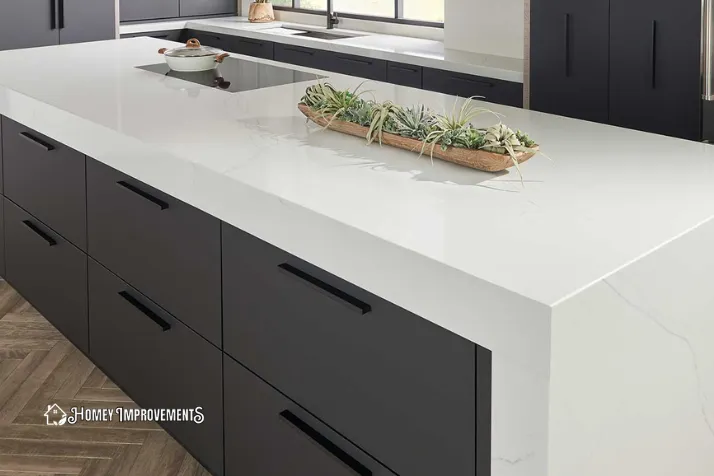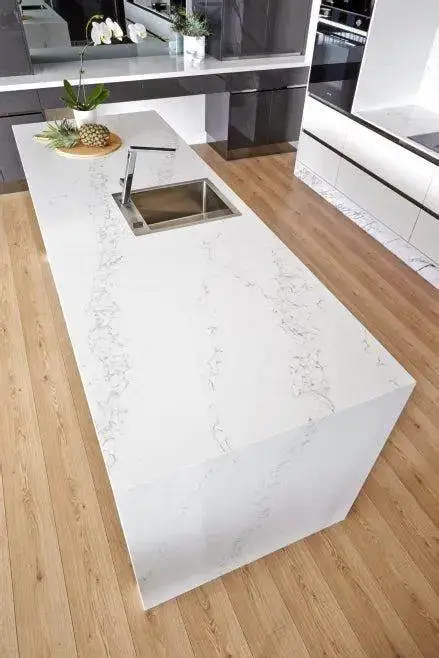Quartz countertops are the go-to surface for modern homes, praised for their durability, design versatility, and low maintenance. But homeowners often wonder: Should I seal my quartz countertops like I would with granite or marble?
In this comprehensive guide, we explore whether sealing quartz is necessary, when it might be useful, and how to apply a quartz-safe surface treatment if needed. You’ll also gain insight into quartz countertop maintenance, costs, and comparisons to other surfaces.

What Are Quartz Countertops?
Quartz countertops are engineered stone surfaces made from around 90–95% natural quartz mixed with polymer resins and pigments. This process results in a non-porous, stain-resistant, and bacteria-resistant surface that mimics the look of natural stone without the porous flaws.
💡 Related read: what is a marble slab?

Do Quartz Countertops Need to Be Sealed?
Short answer: No.
Quartz is non-porous, which means it doesn’t absorb liquids or allow bacteria to grow inside the surface. Unlike granite or marble, which are porous and require annual sealing, quartz countertops come with a built-in seal thanks to their resin binders.
Why Is Sealing Even Discussed for Quartz Countertops?
Some confusion arises because homeowners are used to sealing natural stone. Here are a few reasons sealing is occasionally mentioned in relation to quartz:
- Misinformation or lack of product knowledge
- Low-quality quartz brands may have uneven resin distribution
- Heavy commercial use may demand extra protection
- Outdoor quartz countertops exposed to UV and moisture might benefit from surface treatment
Still, for standard indoor use, sealing is generally unnecessary.
When Might You Consider Sealing Quartz?
While high-end quartz surfaces are maintenance-free, a protective layer may be considered in specific situations:
1. Outdoor Use
Quartz countertops in outdoor kitchens are exposed to the sun, rain, and humidity. Over time, UV exposure can degrade the resin, and a surface protectant may slow this process.
2. Commercial Kitchens
In bakeries or restaurants, countertops endure constant wear, spills, and cleaning with harsh agents. A food-safe sealer might help maintain the finish.
3. Low-End Quartz or Knock-Offs
Some generic quartz brands may not have the same uniformity or resin quality, leading to microscopic surface pores.
How to Apply a Surface Protectant to Quartz (If You Choose To)
If your quartz countertops fall into any of the above scenarios, here’s how to use a quartz-safe sealant or protectant:
Step 1: Clean the Surface
Use a gentle cleanser or warm water and mild dish soap to remove dust, oils, or spills. Let the surface fully dry.
🧼 Related tip: How to Care for Quartz Countertops?
Step 2: Choose a Quartz-Safe Product
Never use traditional granite or marble sealers. Choose one specifically labeled for engineered stone or quartz.
Step 3: Apply Evenly
Spray the protectant on the surface. Use a soft microfiber cloth to rub the product into the countertop in circular motions.
Step 4: Let It Cure
Most products recommend leaving it on for 15–30 minutes. Then wipe away any excess and allow to cure for 24 hours before heavy use.
Step 5: Repeat as Needed
Reapply every 6–12 months for high-use surfaces, or annually for occasional-use countertops.
Maintenance Tips for Quartz Countertops
Here’s how to make sure your countertops stay beautiful without unnecessary sealing:
- Avoid harsh cleaners like bleach or ammonia
- Wipe spills immediately, especially wine, coffee, and oils
- Use trivets for hot pots and pans
- Clean daily with warm water and a soft cloth
🛠️ More guidance: How to Maintain Quartz Countertops?
How Quartz Compares to Other Surfaces (Sealing Included)
| Feature | Quartz Countertops | Granite Countertops | Marble Countertops |
|---|---|---|---|
| Sealing Required? | ❌ No | ✅ Yes (1x/year) | ✅ Yes (1–2x/year) |
| Porous? | ❌ No | ✅ Yes | ✅ Yes |
| Durability | ✅ Very high | ✅ High | ⚠️ Medium |
| Stain-Resistance | ✅ Excellent | ⚠️ Moderate | ⚠️ Low |
| Heat-Resistance | ⚠️ Limited | ✅ Excellent | ⚠️ Limited |
| Maintenance Level | ✅ Low | ⚠️ Medium | ⚠️ High |
Understanding Quartz Countertops Cost
Quartz countertops can range from $50 to $120 per square foot installed. The cost depends on:
- Brand and quality level
- Thickness (2cm vs. 3cm)
- Color and veining style
- Installation complexity
🧾 Related read: How to Clean Granite Countertops Kitchen?
Popular Applications and Styles
Quartz can be used across a range of design aesthetics:
- Quartz countertops kitchen island – Adds a focal point and workspace
- Quartz countertops backsplash ideas – Full slab splash or seamless edge-to-wall
- Quartz countertops outdoor – With proper installation and occasional protection
- Colors – White, gray, black, and marble-look quartz are most popular
Frequently Asked Questions
❓ Can You Use Granite Sealer on Quartz?
No. Granite sealer is formulated for porous stone. It won’t penetrate quartz and could cause buildup.
❓ Can You Polish Quartz to Restore Shine?
Yes, but only with products labeled safe for quartz. Avoid abrasive pads or polishes intended for marble.
🧽 Bonus resource: How to Clean Black Granite Countertops?
Final Thoughts: Should You Seal Quartz Countertops?
In most homes, sealing quartz countertops is unnecessary. Their built-in non-porous structure makes them virtually maintenance-free. But if your countertops are outdoors, in high-use environments, or from lower-end manufacturers, a quartz-safe surface treatment may offer extra protection.
Stick to proper cleaning and care, and your countertops will stay sleek and stylish for decades.

